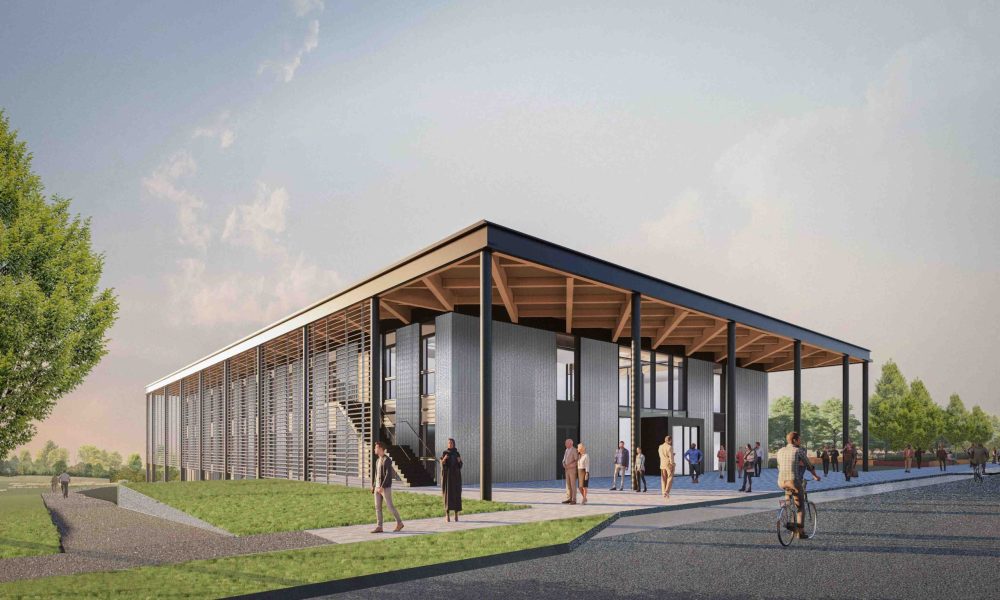
EMBL-EBI’s new building set to support data growth and innovative partnerships
EMBL’s European Bioinformatics Institute (EMBL-EBI) has begun work on a new building, located on the Wellcome Genome Campus, near Cambridge, UK

The building, funded by UK Research and Innovation (UKRI), the Biotechnology and Biological Sciences Research Council (BBSRC), and Wellcome, will be named after the institute’s Director Emeritus and esteemed scientist Professor Dame Janet Thornton.
Critical research infrastructure
EMBL-EBI is the home of big data in biology and hosts the most comprehensive suite of data resources for the life sciences. Millions of researchers from all over the world use EMBL-EBI’s freely available data resources to share and access research data, in order to find solutions to global challenges such as infectious disease, food security, and the biodiversity crisis.
An independent study by Charles Beagrie Ltd, commissioned by EMBL-EBI in 2020, found that EMBL-EBI resources are critical to research and development, and that they contributed to the realisation of future research impacts worth £2.2 billion annually.
“Life scientists increasingly work with complex and large datasets, and rely on open data to push the frontiers of knowledge about the living world,” said Edith Heard, EMBL Director General. “EMBL-EBI is at the heart of this data revolution. The Thornton building will enable the institute to respond to increasing demands on its services and develop new collaborations with academia and industry alike.”
A hub for collaboration
The Thornton building will be a space for cultivating the academic and pre-commercial collaborations required to translate the institute’s data management expertise into practical solutions to global challenges. The building is set to accommodate over 200 members of personnel.
The building design was developed based on the key principles of collaboration, accessibility, and sustainability. The design is inspired by nature and aims to create opportunities for connections with the natural world.
Construction work began in autumn 2022 and the building is expected to open in 2024. This is the institute’s third permanent building.
Dr Amanda Collis, Interim Deputy Executive Chair at BBSRC, part of UKRI, said: “The investments by UKRI and BBSRC into the Thornton building demonstrate our ongoing commitment to supporting and enabling critical infrastructure that is vital to the future of UK bioscience.
“EMBL-EBI is home to world-renowned facilities and as a global hub for research and innovation, we take great pride in working hand in hand with our partners at EMBL-EBI and Wellcome to strengthen the UK’s capacity and capability in this vital area of research innovation.”
Honouring a bioinformatics pioneer
Professor Dame Janet Thornton, whom the building is named after, was the Director of EMBL-EBI between 2001 and 2015. She has recently retired, following an illustrious career studying proteins and ageing. Thornton is one of the world’s pioneers in structural bioinformatics, and one of the first scientists to use computational methods to understand protein structure and function.
She also played a key role in setting up ELIXIR, the pan-European infrastructure for biological data, and is a vocal advocate for open data, as well as a lifelong supporter of women in science. Professor Thornton’s awards and honours list is lengthy, and during her career, she has undertaken leadership roles in the Royal Society, Natural History Museum, and the European Research Council.
“When I started my career, the concept of bioinformatics didn’t even exist,” said Thornton. “The field has grown at lightning speed and EMBL-EBI is one of the very few places in the world facilitating data access and sharing on such a large scale. I hope the new EMBL-EBI building will serve as a springboard for exciting new collaborations that will support the needs of the life science community and contribute to solving some of society’s major challenges.”
World-leading science
The Wellcome Genome Campus is home to some of the world’s foremost institutes and organisations in genomics and computational biology, committed to delivering life-changing science. The Thornton building is the first in a large campus expansion planned for the coming years, which aims to provide greater opportunity for scientific research to be translated into real-world health outcomes.


